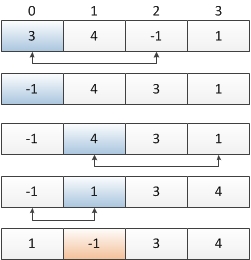Given an unsorted integer array, find the smallest missing positive integer.
Example 1:
Input: [1,2,0]
Output: 3
Example 2:
Input: [3,4,-1,1]
Output: 2
Example 3:
Input: [7,8,9,11,12]
Output: 1
Note:
Your algorithm should run in O(n) time and uses constant extra space.
思路:这个题刚開始是没有思路的,难就难在O(n)时间内常数量空间,所以此题较为考察思维敏捷性。其解题核心思想是将数组的第i位存正数i+1。最后再遍历一次就可以。
其它人的思想,我也是看了这个思想自己写的代码。
尽管不能再另外开辟很数级的额外空间,可是能够在输入数组上就地进行swap操作。
思路:交换数组元素。使得数组中第i位存放数值(i+1)。
最后遍历数组,寻找第一个不符合此要求的元素,返回其下标。整个过程须要遍历两次数组,复杂度为O(n)。
下图以题目中给出的第二个样例为例,解说操作过程。

妈蛋。这题挣扎好久。
首先思路上,其次临界条件,这题和以下题异曲同工:
n个元素的数组,里面的数都是0~n-1范围内的,求数组中反复的某一个元素。没有返回-1, 要求时间性能O(n) 空间性能O(1)。
public int firstMissingPositive(int[] nums) { if (null == nums || nums.length == 0) { return 1; } for (int i = 0; i < nums.length; i++) { while (nums[i] > 0 && nums[i] != i + 1 && nums[i] <= nums.length) { int temp = nums[nums[i] - 1]; nums[nums[i] - 1] = nums[i]; nums[i] = temp; } } for (int i = 0; i < nums.length; i++) { if (nums[i] != i + 1) { return i + 1; } } return nums.length + 1; }